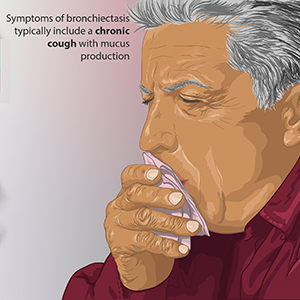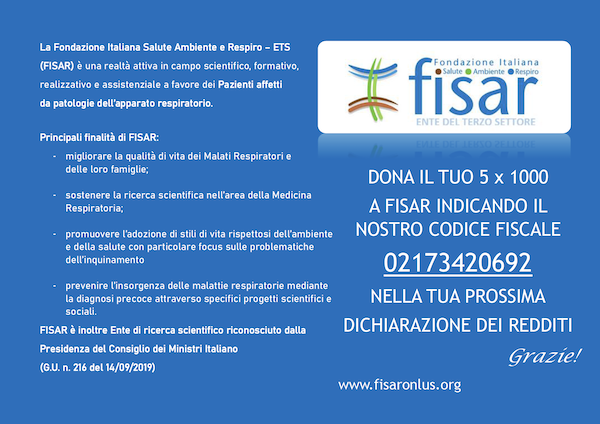Monitoring daily symptoms and (self-reported) exacerbations in patients with bronchiectasis: a prospective study
Keywords:
Bronchiectasis, exacerbations, symptom diaryAbstract
Background: Exacerbations are pivotal events in the natural history of patients with non-cystic fibrosis bronchiectasis (NCFB), since they have a negative impact on the functional evolution of these individuals. The daily symptoms of patients with NCFB show great variability, which negatively affects their self-perception of symptoms and exacerbations. The aim of this study was to identify daily symptoms in patients with NCFB, and to investigate whether there is a correlation between the frequency of self-reported exacerbations and events defined according to the criteria established in the literature to define exacerbation in bronchiectasis.
Methods: This observational and prospective study was carried out in outpatient clinics of a Brazilian public university hospital. Over 24 weeks, patients completed a diary in which daily symptoms, self-reported exacerbations, and demands for medical care for respiratory symptoms were recorded. The instruments used (diary and symptom scores ranging from 0 to 12) were developed by the researchers. The participants also answered questionnaires mMRC, Leicester’s, and St. George's Respiratory (SGRQ).
Results: Twenty-eight patients returned the diary, their mean age was 54 years, and 50% out of them were classified
as mild by the FACED score. Cough (64%) and expectoration (62%) were the most frequent symptoms. Correlations were found between the stability score and the mMRC (r=0.4727, p=0.011) and SGRQ (r=0.6748, p<0.0001) questionnaires. The number of self-perceived exacerbations (24) was significantly lower than exacerbations using the exacerbation consensus (63) (p<0.01). Additionally, no correlation was found between these two criteria.
Conclusions: There was great variability of symptoms among the individuals sampled, and even for the same individual, over time. Patients had low self-perception of exacerbations, which suggests that strategies aimed at improving this self-perception may contribute to the early detection of exacerbations.
References
Chalmers JD, Aliberti S, Filonenko A, Shteinberg M, Goeminne PC, Hill AT, et al. Characterization of the "frequent exacerbator phenotype" in bronchiectasis. Am J Respir Crit Care Med 2018;197:1410-20.
Martinez-Garcia MA, Athanazio RA, Girón R, Máiz-Carro L, de la Rosa D, Olveira C, et al. Predicting high risk of exacerbations in bronchiectasis: the E-FACED score. Int J Chron Obstruct Pulmon Dis 2017;12:275-84.
Hill AT, Haworth CS, Aliberti S, Barker A, Blasi F, Boersma W, et al. Pulmonary exacerbation in adults with bronchiectasis: a consensus definition for clinical research. Eur Respir J 2017;49:1700051.
Chawla K, Vishwanath S, Manu MK, Lazer B. Influence of pseudomonas aeruginosa on exacerbation in patients with bronchiectasis. J Glob Infect Dis 2015;7:18-22.
Goeminne P, Dupont L. Non-cystic fibrosis bronchiectasis: diagnosis and management in 21st century. Postgrad Med J 2010;86:493-501.
Nicotra MB, Rivera M, Dale AM, Shepherd R, Carter R. Clinical, pathophysiologic, and microbiologic characterization of bronchiectasis in an aging cohort. Chest 1995;108:955-61.
Palwatwichai A, Chaoprasong C, Vattanathum A, Wongsa A, Jatakanon A. Clinical, laboratory findings and microbiologic characterization of bronchiectasis in Thai patients. Respirology 2002;7:63-6.
Spinou A, Fragkos KC, Lee KK, et al. The validity of health-related quality of life questionnaires in bronchiectasis: a systematic review and meta-analysis. Thorax 2016;71:683-94.
Goeminne P, Dupont L. Non-cystic fibrosis bronchiectasis: diagnosis and management in 21st century. Postgrad Med J 2010;86:493-501.
Martínez-García MÁ, de Gracia J, Vendrell Relat M, et al. Multidimensional approach to non-cystic fibrosis bronchiectasis: the FACED score. Eur Respir J 2014;43:1357-67.
Artaraz A, Crichton ML, Finch S, et al. Development and initial validation of the bronchiectasis exacerbation and symptom tool (BEST). Respir Res 2020;21:18.
Langsetmo L, Platt RW, Ernst P, Bourbeau J. Underreporting exacerbation of chronic obstructive pulmonary disease in a longitudinal cohort. Am J Respir Crit Care Med 2008;177:396-401.
Omachi TA, Sarkar U, Yelin EH, Blanc PD, Katz PP. Lower health literacy is associated with poorer health status and outcomes in chronic obstructive pulmonary disease. J Gen Intern Med 2013;28:74-81.
Rocha PC, Lemos SMA. Conceptual aspects and factors associated with functional health literacy: a literary review. CEFAC 2016;18:214-25.
Sun X, Shi Y, Zeng Q, Wang Y, Du W, Wei N, et al. Determinants of health literacy and health behavior regarding infectious respiratory diseases: a pathway model. BMC Public Health 2013;13:261.
Korpershoek Y, Bruins Slot J, Effing T, Schuurmans M, Trappenburg J. Self-management behaviors to reduce exacerbation impact in COPD patients: a Delphi study. Int J Chron Obstruct Pulmon Dis 2017;12:2735-46.

Published
Issue
Section
License
Copyright (c) 2022 The Author(s)

This work is licensed under a Creative Commons Attribution-NonCommercial 4.0 International License.
Mattioli 1885 has chosen to apply the Creative Commons Attribution NonCommercial 4.0 International License (CC BY-NC 4.0) to all manuscripts to be published.





